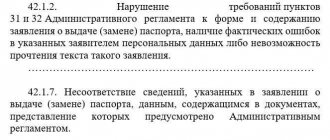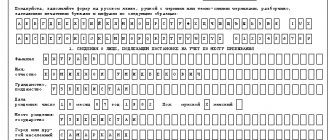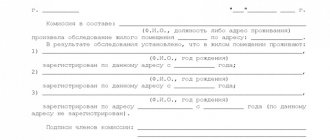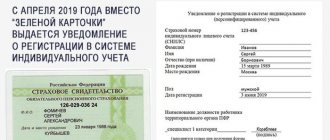In domestic legislative acts, such a concept as migration registration of Russian citizens living in the Russian Federation is not applied. If we are talking about the movement of Russians within the country, another legislative concept gains force - registration records, the purpose of which is to record the place where a citizen is located or lives.
This is what registration at the place of residence of the Russian Federation looks like
Migration registration is discussed when the movement of foreigners and persons without any citizenship throughout the country is controlled.
The purpose of accounting for migration and registration
The country's federal laws oblige both citizens of the Russian Federation and visitors from other states and persons without citizenship to notify the migration authority of a change of location. This is required in order to control the flow of foreigners arriving in the country every day, as well as Russians actively moving around the territory of their state.
The main goal of migration registration, which is relevant for Russians and important for all visitors, is to provide people with the opportunity to use their freedoms and rights, fulfill obligations to the country, its society and compatriots.
In Russia, as in all other countries of the world, migration registration is the recording in documents of data about a citizen at the place of stay or residence. It is very important not to confuse these terms.
Watch the video: Registration rules.
Other nuances of the process
Registration of temporary registration is possible if the consent of one of the following persons is provided:
- an individual owner of a home;
- legal the person who owns the residential property as a whole;
- the landlord and all persons living in the apartment (if it is a municipal apartment).
In the latter case, the landlord must be informed about the new temporary resident in accordance with the Housing Code of the Russian Federation (Article 80). In such housing stock, the maximum possible registration period is 6 months. In this case, the landlord may refuse registration if the area of housing per person in the case of registration of a new resident does not meet the established standards.
Article 80. Temporary residents
Consent to temporary registration must be written. It is certified by a notary or directly at the place where documents for temporary registration are submitted (of course, in the presence of the relevant persons).
The period of temporary registration must be agreed upon by the parties in advance. In this case, the question arises: how long can you maximum live at the temporary registration address? By law, this period cannot be more than 5 years.
Having left one permanent residence address, you need to register at a new address within the next few days. seven days. This norm was introduced by Resolution No. 713 of July 17, 1995. The act specifies all the nuances of deregistration and registration.
. It also indicates the persons responsible for accepting and processing documents for registration purposes.
What is considered a place of residence?
In the legal sense, the place of residence may be temporary, that is, it may not be the living space where you are registered as the owner or the owner’s closest relative.
The role is played by the foundation on which you occupy the living space:
- The square meters belong to you according to the documentation.
- There was a signing of a rental or sub-tenancy agreement.
- A contract has been concluded for the hiring of specialized residential areas, etc.
The place of residence can be positioned as follows:
- A separate room in a dorm or regular apartment.
- Apartment.
- House.
- Premises located in specialized housing facilities, etc.
The place of residence may be living space that belongs to you according to documents
For example, such a place for a foreigner could be an apartment that he rents after receiving a temporary residence permit.
What is considered as a place of stay?
Legislative acts consider the place of stay as an object where a foreigner or Russian has been staying for a long time, but it is not his permanent place of residence, that is, it is temporary. It could be:
- Hotel room.
- Hospital ward.
- Prison cell.
- A room in the sanatorium department.
- Camping.
The hotel can be considered as a place of stay
For example, after receiving a temporary residence permit, and not yet having found an apartment to rent, you live in a hotel. The hotel is considered as a place of stay.
What is meant by fictitious registration?
In migration and legal practice, the concept of “fictitious registration” is used, which implies the submission by foreigners or Russians of invalid data about their place of residence or stay.
There are penalties for such actions. This could be a large fine (100,000–500,000 rubles) or imprisonment for violators of the law.
Article 322.2. Criminal Code of the Russian Federation
Registration of Russians
Migration of Russians within the country is subject to accounting in the same way as change of location by foreigners or stateless persons.
According to the rules of migration legislation, those who change their fixed address or change their place of residence for a long period of time are required to notify government authorities about their new place. They are also required to leave their old location.
You can re-register as follows:
- Appearing in person at the registration service.
- By sending a notification online using the municipal and government services portal.
- Through the services of the Russian Postal Department (only if the place of residence is registered).
How do you register at your place of residence?
If you change your place of residence, you must notify the local registration authorities about this within a week (seven calendar days) after moving.
You need to provide:
- Passport.
- A statement indicating that a change of residence has occurred.
- The paper based on which you moved into the living space declared as the new place of registration.
Sample application for registration at place of residence
The latter should be provided only in the case where information about the reasons for your relocation is not available from municipal or state authorities.
As a result, you will be deregistered at your previous place of residence.
How do you legally register at your place of residence?
If you have changed your place of residence for quite a long time (we are talking about exceeding the period of 90 days), in order not to break the law, you should contact the registration authorities with the following documents:
- Internal passport.
- A statement describing the situation and reasons.
- Justification in the form of documents indicating these reasons.
After reviewing the documentation provided, you will be issued a certificate giving you the right to temporarily live in a new place. Your fixation on the old will remain in force.
This is what a certificate of registration at the place of residence looks like
How are newborns registered?
A person born within Russia becomes its citizen from the date of his birth. Parents are required to register their child within the prescribed time frame. This is stated in the Law of the Russian Federation No. 5242-1. This document states that parents must notify the registry office about this within a month after the baby is born.
Then the new Russian must be registered with the registration authorities. This should be done within seven days after receiving the documents from the registry office.
If you ignore the requirements described above, parents will be fined in the amount of 2000–2500 rubles.
Watch the video: How to register a newborn baby.
How are citizens over 14 years of age registered?
Like kids, Russians who have already celebrated their 14th birthday, that is, older teenagers, are not responsible for the fact that they were not registered at their place of residence or stay.
Citizens responsible for minors before the law are required to register this category of persons.
Example of registration at the place of residence of a minor citizen
Discharge of the child
The rules for registering and deregistering a minor child from an apartment are somewhat complicated, since the rights of children are protected by the state represented by the guardianship authorities. Quite often, you have to go to court to evict children.
The first thing to remember is that children can be registered even without the consent of home owners and other residents at the same address where at least one of their parents is registered. Accordingly, if this parent is evicted, the child is automatically evicted. If a parent is evicted against his will, the owner will, of course, have to do this through a lawsuit. If a parent and child are discharged of their own free will, they apply to the FMS in the standard manner. However, the child cannot be discharged to anywhere; you will have to provide confirmation that a new place of residence already exists and it is quite suitable for permanent residence there. Based on this, it is advisable to issue an extract simultaneously with registration at the new place of residence.
How to deregister?
The legislative acts of the Russian Federation provide for the rules for deregistering Russians both at the place where they live and at the place of stay.
Place of residence: how to deregister
The following circumstances are considered as grounds:
- Fictitious registration, which the citizen was caught doing.
- The documentation submitted to government agencies turned out to be fake.
- The applicant was evicted.
- The applicant died.
- By court decision, the citizen was declared missing.
- The place of residence has changed.
Application form for deregistration due to change of residence
If the place of residence has been changed, the relevant documentation must be submitted independently. If registration is revealed to be fictitious, forced deregistration is carried out. All other cases require the submission of documents by legal entities or individuals who have an interest in this issue.
Stamp of deregistration at the place of residence
You can find out more about how removal from your place of residence occurs on the website.
How to deregister at the place of stay?
If the period noted in the application submitted during registration expires, the citizen is automatically considered deregistered. When it comes to sanatoriums, holiday homes, hotels, etc., registration ends when the business traveler or vacationer leaves the named institutions.
If a Russian leaves before the deadline noted in the documentation, he or the one who provided him with a roof over his head is obliged to submit an application for departure. This can be done through the postal service or the government services portal.
Additional ways to submit documents
If the homeowner does not have time to wait in line at the Ministry of Internal Affairs office, then you can choose one of the more modern options: submit an application through State Services or the MFC
.
To work with the State Services portal, you must have a personal account. In it you can choose one of two options:
- Fill out the application and attach copies of documents. After submitting the application, the system will generate a ticket for an authorized employee to visit. You will need to come to him and present the original documents. After verification of the originals, a registration stamp will be placed in the passport.
- Receive a pass to visit the OMV. At the specified time, you will only have to come and submit the original documents. The employee will issue a document acceptance coupon and keep your passport. You will be able to pick up the documents in 3 days.
If you choose the method of submitting documents for registration through the MFC, you will have to be patient. You need to contact the multifunctional center that is geographically related to your department of the Ministry of Internal Affairs and provide the specified package of documents. Clients are served on a first-come, first-served basis and it takes no more than 15-20 minutes. The period for receiving documents will be increased by the period of sending your documents
to the authorized department of the Ministry of Internal Affairs.
As you can see, the procedure is simple and does not require special knowledge. It is important to remember only to meet deadlines. Sometimes, in order to carry out the registration procedure in a timely manner, especially for those who have moved to large cities, it is necessary to turn to third parties to speed up the process
. In this case, it is worth finding a responsible organization with an impeccable reputation in advance.
Features of migration registration
Migration registration actions are always aimed at recording in documents foreigners or persons who do not have citizenship who came to the Russian Federation.
Russian law states that this type of accounting is for notification purposes only. The exception is situations identified in constitutional and federal law.
Deadlines for foreigners to register
The main law regulating the registration procedure for foreign guests is Federal Law 109.
According to Russian legislation, all foreigners entering the state and intending to stay in it for more than a week are required to notify the Federal Migration Service of their arrival within seven days. Information about the arrival is entered into the database of the migration authority.
Watch the video: When should a foreign citizen register for migration in the Russian Federation?
Those who break the rules will face fines and deportation.
Important: two concepts that are often confused apply to foreign citizens living in Russia: migration registration and temporary registration.
Migration registration and temporary registration
Migration registration is a notification of arrival submitted to the relevant service. A form for notification of the arrival of a foreign citizen is available.
Sample of a detachable part of a notice of arrival of a foreign citizen
Temporary registration is a registration that foreigners usually do after receiving a temporary residence permit.
This is what temporary registration looks like
Registration of foreign citizens can be carried out at the place of stay or residence. You should contact the local authority of the Ministry of Internal Affairs of the Russian Federation operating in the area where the premises to which the applicant will be assigned are located.
The host party or the guest himself can contact the migration service. You can submit your application as follows:
- Personally.
- Russian Post.
- Through the state portal class=”aligncenter” width=”763″ height=”435″[/img]
You can submit an application to the migration service through the state services portal
Important: registration always presupposes the presence of a living space where the registrant will live.
Registered foreigners have the right to stay in the Russian Federation for the duration of their visa. If a guest arrives from a visa-free country, he is required to leave the Russian Federation after 90 days from the date of entry. Foreign guests have the right to a longer stay in the country after receiving a temporary residence permit.
This is what a temporary residence permit looks like in the Russian Federation
The host
An important point in the registration procedure is the receiving party. The law defines who has the right to act in this role:
- Persons with Russian citizenship.
- Branches, government agencies, legal entities where the applicant lives or works.
- Foreigners living in the Russian Federation on the basis of a residence permit or temporary residence permit.
- Foreign citizens are highly qualified specialists who own living space located in Russia (for family members only).
- Hotel administrations.
What documents must be provided?
To register a foreign guest for housing in the Russian Federation, it is necessary to provide the migration authorities with a completed notification of a special form, including:
- Data from the passport of a foreign citizen.
- Information from the migration card.
Completed Russian migration card
- Information about the visa, if entry was based on it.
The receiving party must complete the notification. The documents listed above are not confiscated from the owner.
Who can avoid a fine
There are conditions when, even if there is a violation, you can avoid a fine under Articles 19.15.1 and 19.15.2 of the Code of Administrative Offenses of the Russian Federation.
Previously, you could not be fined for living without registration and violating the rules in the following cases:
- if a person does not have temporary registration, but has a permanent one in the same region. Similarly for Moscow and the Moscow region, St. Petersburg and the Leningrad region, Sevastopol and Crimea;
- if the period of temporary residence is no more than 90 days;
- if spouses, natural and adopted children, spouses of children, parents and their spouses, grandparents or grandchildren of the owner of the property live without registration. At the same time, the owner himself has registration in the same premises. Only residents will not be fined for violating the rules on this basis. The owner will avoid liability under Art. 19.15.2 only when registering those living in the same region, family relationships do not affect.
As of February 28, 2021, changes made to the administrative code took effect. They will help you avoid a fine for staying without registration - if it is not completed on time or if it is not registered at all.
This relaxation applies to family members - that is, the situation when relatives of the owner live in the apartment. Previously, it was also possible to avoid a fine, but now more people will be able to live and receive loved ones without registration: the circle of relatives not subject to punishment has become wider.
That is, from February 28, the number of persons who do not face a fine for lack of registration also includes wards, adoptive parents, guardians, trustees, siblings.
For example, Elena moved from Chelyabinsk to Moscow. Her sister decided to move in with her. She bought a new building and is currently living in Elena’s apartment, but without registration. Previously, Elena and her sister could have been fined 5,000 R each. But from February 28, their family relationships will help to legally avoid liability and save 10,000 RUR.
But if we are not talking about living without registration, but about violating the rules under Article 19.15.2, that is, false data or failure to meet deadlines, then Elena’s sister will not be fined - she is a relative, but Elena herself can. Because under this article homeowners have a separate basis for exemption from liability. If my sister had permanent registration in the same region, Elena would definitely not have been fined.
If the fine is issued according to the old rules
If the violation protocol was drawn up before February 28, 2021, when brothers, sisters and adoptive families had not yet been given any relief regarding registration, the fine does not need to be paid.
In such cases, the norm of Article 1.7 of the Code of Administrative Offenses of the Russian Federation applies: if the law mitigates liability, there is a violation, but the fine has not been paid, the violator is released from it. That is, the law here has retroactive force. If you or someone close to you was fined before February 28, and after that they might not have been fined, don’t pay anything.
How are foreign citizens taken into account at their place of residence?
Both Russians and foreign guests and persons without any nationality can be registered not only at the place of their temporary stay, but also at the place of residence. The basis for the second is the right of foreigners to use residential square meters located within Russia.
Sample application for registration at the place of residence of a foreign citizen
A foreigner is required to submit an application to the migration authority containing a request to register him. This must be done no later than seven days after receiving a temporary residence permit or temporary residence permit or from the day of your arrival in the locality in which the living space is located. you can follow the link.
Documentation
Along with the application when registering a foreign guest at the place of residence, the following must be presented:
As a foreigner:
- An identity document considered legitimate in the Russian Federation.
- Passport with a stamp for temporary residence or residence permit.
This is what a Russian residence permit looks like
- Papers indicating that the applicant has the legal right to use the residential areas indicated in the documents.
A person without citizenship:
- Residence permit or temporary residence permit.
- Documents confirming the applicant’s legal right to use the residential areas indicated therein.
Such a document may be a residential lease agreement
In this case, foreign citizens will have to pay a state fee of 350 rubles.
More information about what documents are needed to register a foreign citizen in Russia can be found on the website.
Law on residence registration and dacha registration in 2021
The bill, which provides the opportunity to register in a dacha, was first published in 2021. It also introduced a new definition of an “individual residential building,” which is a structure not exceeding 3 floors for one family.
. According to it, in order to register a house on a plot belonging to a gardening partnership, you need to prove the need for registration with documents.
To do this, several conditions must be met:
- the site and all objects on it must belong to the applicant;
- there is no other permanent residence permit (and if there is one, then you need to be discharged from there);
- it is necessary to obtain a court decision on the possibility of registration on this site (in this case, the house must meet the established requirements);
- the site must belong to a populated area (agricultural land is not suitable for such a purpose).
To register at the dacha, all of the following conditions must be met:
- The results of the examination must be on hand, confirming the possibility of living in the house at any time of the year: the presence of a foundation and intact walls;
- compliance of communications with established standards;
- thermal insulation of walls maintaining temperatures above 18 degrees. and humidity up to 80 percent;
- house waterproofing;
In order to obtain registration at your dacha, you can first try contacting the Federal Migration Service, providing the following documents:
- date for house and plot;
- BTI registration certificate;
- receipt of payment of the duty;
- power of attorney (if the process is handled by the owner’s representative).
If the Federal Migration Service refuses registration, there is only one thing left to do - file a lawsuit. In this case, the same documents must be submitted with the claim, and in the application itself it is necessary to indicate that the dacha house is recognized as residential, attaching the relevant resolutions
. If everything is done correctly, the court will rule in favor of the applicant and force the Federal Migration Service to compulsory registration at the dacha.
Before registering at a dacha, you need to take into account the disadvantages that arise.
The disadvantages of registering a garden plot are as follows:
- the need to pay increased taxes for residential real estate;
- as a rule, limited access to social objects. infrastructure;
- time and financial costs for collecting papers and the legal process associated with registration of registration.











